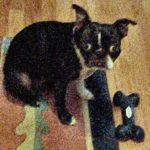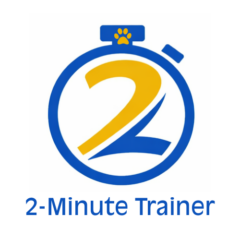
We hear it all the time.
“My dog peed on the bed to spite me.”
“Fifi knows better – she did it because she was mad at me.”
“Phydeaux is so stubborn – he just ignores me when I tell him something.”
“Rover is so defiant. He knows he’s not supposed to do that!”
Actually – no. That’s not how dogs think. If your dog is sitting there staring at you after you’ve told her to do something, either she’s confused or she doesn’t know what you want. And, chances are, she’s afraid of making the wrong decision.
Dogs don’t think the way we do. They truly live in the moment, without comprehension of “cause and effect.” We know that, for many dogs, eating grass will result in vomiting. Dogs don’t know that. The “eating grass” is far enough removed (even if it’s minutes later) from the “vomiting” that the dog is incapable of making the connection. Even though Spot throws up EVERY SINGLE TIME he eats grass, he will never connect the two (causation) and develop a dislike of eating grass.
We humans make that connection so easily that it takes some doing to “think like a dog.” Trying to adjust your thinking, see things from your dog’s perspective, will help you communicate better with your dog.
Causation vs. correlation
Dogs learning with positive-reinforcement games are willing to try and keep trying. The worst consequences of “getting it wrong” for our dogs is lack of reward.
That’s part of the difference in thinking. Dogs are good at connecting the dots – if I do good “stuff,” I get a treat, or I get to play. They excel at association, or correlation, especially if the things (behavior and reward) are close in time. Dogs see the relationship between the two events (correlation).
It’s why the “clicker,” which is a “bridge” to the reward is such a valuable tool. It lets the dog know that, right now, I was a good doggo. Even if the reward is delayed, the dog knows it’s coming.
If, however, a dog is punished or negatively reinforced for incorrect behavior, he may develop a fear of doing the wrong thing. The consequence can be that the dog either does nothing (stares at you), or, since he can never “win,” gives up and does whatever he feels like doing (defies authority).
It’s not easy to adjust your thinking. People are always in “if this” then “that” mode. From the time we’re infants we’re taught to think of the consequences of our actions and to plan for the future. Dogs’ brains don’t work that way.
We can learn a lot from our dogs about how to be “in the moment” and enjoy every day as it comes. It can be frustrating at times, like when you see your dog eating grass again. And it can be joyful as every single toss of the ball is as much fun as the first one.
